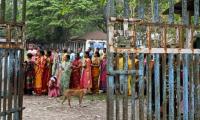Pakistan’s leading soldier statesman who kept chancelleries in important capitals in awe for years breathed his last on January 25, 2016 around 10pm at the Naval Hospital in Islamabad.
The news was relayed to the military high command; by the next morning, an army officer visited Sahabzada Yaqub-Khan’s house to inform the family that his funeral would be arranged in the afternoon at the Army Graveyard in Rawalpindi. The grand old man’s funeral was organised as a military action with its usual precision.
The funeral procession, led by a military escort vehicle, slowly made its way towards Rawalpindi, reaching the graveyard just in time for Gen Raheel Sharif to join the first row of mourners at the janazgah.
I came to know Sahabzada Yaqub-Khan as Pakistan’s foreign minister from 1982 onwards. By then, he had served as ambassador to Paris, Washington and Moscow for a decade. His move to the diplomatic field came after Zulfikar Ali Bhutto, acting as president and chief martial law administrator, had rescinded Yahya’s orders to demote and dismiss Yaqub-Khan for disobedience. Thus his military rank as lieutenant-general and all benefits including pension were restored.
Very few know that Bhutto’s decision to appoint Gen Yaqub as ambassador to France was not solely motivated by a desire to recognise his great talent. It was also due to Bhutto’s permanent sense of insecurity. Having Yaqub around amid reports of his popularity in army circles was a risk Bhutto was not prepared to take. Bhutto frequently resorted to ‘exiling’ problematic civil and military officers. Qamarul Islam, Inayatullah, Gul Hasan, Rahim Khan, Akbar Khan and Majid Malik were sent out as ambassadors.
Yaqub-Khan’s rise in the diplomatic field was no less remarkable than his 30-year military career. I was among the foreign service officers who witnessed Sahabzada’s growing stature as an outstanding diplomat and statesman in 1980s. He had successfully combined military acumen with diplomatic finesse to a level where he was received as a privileged interlocutor in important capitals. Gen Zia who had served under Yaqub-Khan at the Quetta Staff College continued to address him as ‘Sir’ after making him foreign minister.
Yaqub-Khan’s linguistic precision was quite extraordinary. The uninitiated at the Foreign Office were advised to ensure that they spelt the name correctly and certainly not to write it as Sahibzada Yaqub Ali Khan for three reasons.
First, the title was to be spelt as Sahabzada to differentiate it from the colloquial ‘sahib’. Second, Ali was not part of his name. Third, since there were millions of Khans, he chose to hyphenate the name to be addressed as Yaqub-Khan. Now that the Sahabzada is no longer among us, let us hope that he will forgive all those busy writing his name as they desire.
On the day of Sahabzada’s funeral, I heard some colleagues describing his death as the end of an era. It was certainly the end of a chapter. Some readers may recall that a very important year of his life was spent under the Quaid-e-Azam, as the officer commanding the governor-general’s bodyguards. In his moments of introspection, Yaqub-Khan recounted the memories of those very special days spent in proximity of someone who had changed the course of history.
Their first encounter began with the then Major Yaqub being presented to the Quaid as the officer commanding his bodyguards. ‘What do I need a bodyguard for!’, the Quaid exclaimed. The young officer highly appreciated the Quaid’s qualities of simplicity, integrity and uprightness. Later, Sahabzada would be known for these traits as well as for sartorial elegance, something dear to the Quaid.
In one of our conversations, Sahabzada reminisced about the Quaid’s health problems resulting in situations which were hard to explain such as his absence from the airport to receive the viceroy and then leaving the banquet as he badly needed rest. The way Sahabzada narrated these events, there was never a sign of showing his own importance. He deflected every suggestion to write his memoirs and politely declined my request to quote him over some very important developments in our history to which he was privy.
Tailpiece: Sahabzada was brought to diplomacy by Z A Bhutto and elevated as foreign minister by Gen Zia. However, it is no secret that he had problems dealing with later civilian leaders starting with Mohammad Khan Junejo. One day, I might be able to put together some of his thoughts on the subject as his rapport with successive civilian rulers had a bearing on some critical issues beginning with the Geneva negotiations on Soviet withdrawal from Afghanistan.
Email: saeed.saeedk@gmail.com
A woman walks past a building of the International Monetary Fund. — AFP/FileThe annual and spring meetings of the...
Late Benazir Bhutto's daughter Asifa Bhutto Zardari addresses the Christian community in Bihar Colony on January 23,...
Representational image. — PexelsWater is an important scarce natural resource that is required for several everyday...
Pakistani employees of online marketplace company Kaymu at work in Karachi. — AFP/FileThe true spirit of development...
India uses Afghanistan as a backstage area to carry out terrorist attacks against Pakistan
Another report by the Pakistan Institute of Peace Studies states that 78 per cent of attacks have been carried out by...







